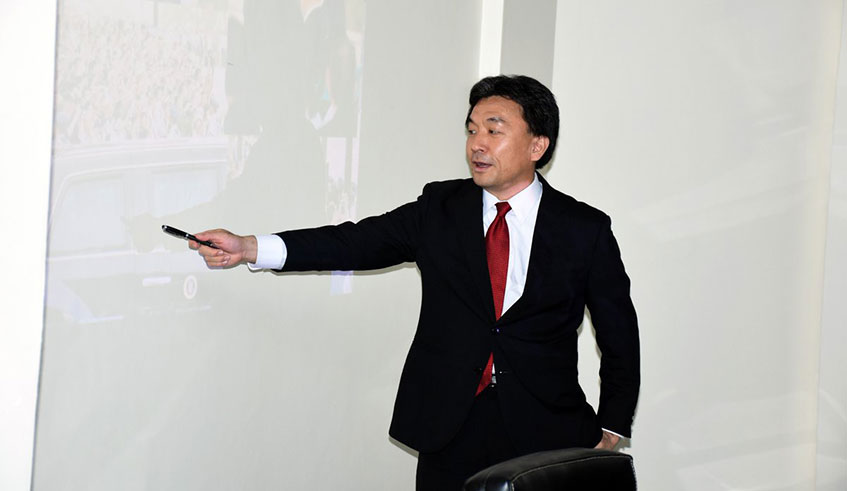During a peace building public lecture at the University of Rwanda Japanese shared experiences with their Rwandan counterparts on how the Asian country fostered peace and development after the Second World War.


Scholars and academics should play a role in shaping public discourse on peace, as well as influencing policies that are more rational for the stability of their countries.
The call was made during a peace building public lecture at the University of Rwanda where Japanese shared experiences with their Rwandan counterparts on how the Asian country fostered peace and development after the Second World War.
The lecture was attended by officers from Rwanda Defence Force and Rwanda National Police, diplomats, scholars, among others.
Hideaki Shinoda, a professor from Tokyo University of Foreign Studies and the Director of Hiroshima Peacebuilders Centre shared the case of Japan in peace building, recovering from minor internal wars as well as to major external ones including atomic bombing of Japanese cities like Hiroshima.
Shinoda said that academics are given the role in society to identify and analyse problems and to help policymakers to better understand and contexualise the problems. "As a scholar, I don’t exaggerate our role, though of course academics are given the role in society to identify and analyse the problems. They must take the lead to help practitioners better understand and better analyse the problem by offering technical investigation and so on. Indirectly, they are helping practitioners exercising some intellectual part of their work,” he said. Shinoda highlighted the role that scholars played in shaping Japan’s decisions after the tragic 1945 defeat in the Second World War and the atomic bombs which were dropped on their cities.
Among the things debated was whether alliance with the United States of America was good for Japan or not.
"Many scholars debated. Debating is part of our jobs. That means that many scholars have different views. By promoting debate we aim to influence policy makers and the general public. They more or less choose what they may want to choose. Our job is to offer possible choices of our policies,” Giving the example of the alliance of Japan with the united states of America despite the atrocities of the second world war, Shinoda said that sometimes policies can be painful but rational.
So, as scholars debate the public and policymakers get to know which one is worthy to be employed, Shinoda said. "We all have to consider options always. For more than 70 years, scholars (in Japan) have been discussing that other options are more painful for Japan (than remaining in alliance with the USA),” he added.
"So, through that kind of debate we promote, we let the general public realise that one option may be painful, yet considering that others are more painful, they get to choose to go with the rational one,” he said.
"If people start to feel like that, it could be as a result of influence by scholars,” he added.
Dr. Emile Rwamasirabo, Rwanda’s former envoy to Japan said that Rwanda’s reconstruction process and that of Japan are similar, given that they both involved citizens sitting down, look at ideas, discuss which was best for them.
"In Rwanda around 1998, discussions were going on and citizens were keen on sharing ideas about what kind of country they want. That is where such programs like Gacaca, and Ndumunyarwanda came from,” he said.
He added that both countries put emphasis on education.
"They (Japan) built a great education system. They also envisaged technology as a driver to fast development of their economy. You see even in Rwanda we realised that we don't have a lot but we have Rwandans whom through technology and education can help develop their country,” he said.
"After twenty years, things have changed in this county and we are better than some countries which didn't even have wars,” he added.
Then he talked about unity as another driver for the development of Japan, a lesson experience for Rwanda
"Japan made great achievements because after the Second World War, there was consensus between the people and the politicians to have one vision. They had been defeated badly; their economy had slumped at that time. They decided to build peace. They left going for wars, and the funds that were going to the military went to building the country. It's a great thing to a vision for the country,” he said.


